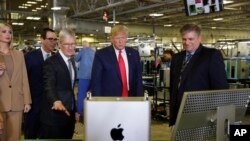President Donald Trump’s visit this week to a Texas manufacturing plant highlights the ongoing dance between the iPhone maker and the Trump administration over China and tariffs.
The visit came as the U.S. is set Dec. 15 to raise new tariffs on imports from China, as part of its trade war with Beijing.
Among U.S. technology companies, Apple has much at risk since many of its products, including the iPhone, Apple Watch and the iPad, are made in China.
Two economies
The economies of China and Silicon Valley are knitted together in complicated ways. Chinese factories make Apple products from components that come from the U.S. But Chinese factories also make some of the components for Apple’s Mac Pro, which has been made in the U.S. for years.
The trade war between Washington and Beijing has put pressure on these cross-border supply chains.
In July, Trump said no to Apple’s request for tariff waivers.
But in September, the administration granted 10 waivers for those parts. In response, Apple said its Mac Pro would continue to be made in Texas by a firm called Flex.
“I think the conversation about perhaps exempting Apple from these tariffs is a recognition that in fact that tariffs can differentially impact in a negative way various U.S. companies,” Sean Randolph, senior director at the Bay Area Council Economic Institute, said. “And if it’s a flagship company like Apple with a global brand, that becomes an issue.”
WATCH: Trump's Visit to Apple Factory Brings Possibility of More Tariff Relief
Highlighting US manufacturing
Flash forward to the photo opportunity this week in Texas. With Apple CEO Tim Cook by his side, Trump toured the plant and received a plate that said “Assembled in the USA.”
Referring to Cook, Trump said, “The nice part here is he doesn’t have to worry about tariffs. Because when you build in the United States, you don’t have to worry about tariffs.”
During the visit, Trump appeared to take credit for the manufacturing plant. Later, he incorrectly tweeted that he had opened “a major Apple Manufacturing plant,” at the same time taking a jab at the Democrats, which was also false.
More tariff waivers ahead?
Trump said he was looking at more possible waivers for Apple, which competes with Samsung, the South Korean electronics giant.
“The problem we have is you have Samsung, it’s a great company, but it’s a competitor of Apple,” he said. “And it’s not fair because we have a trade deal, we made a great trade deal with South Korea. But we have to treat Apple in a somewhat similar basis as we treat Samsung.”
It remains to be seen how the Trump administration uses tariffs to not only pressure China but also U.S. companies.
